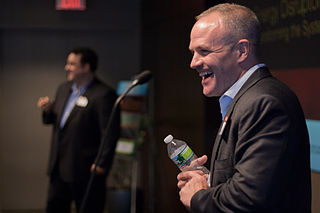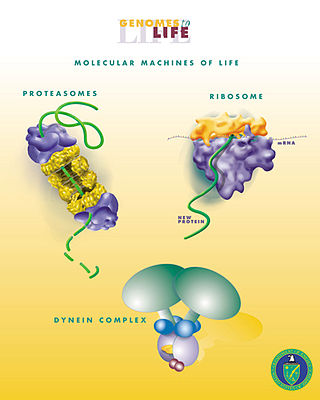
Biotechnology is a multidisciplinary field that involves the integration of natural sciences and engineering sciences in order to achieve the application of organisms and parts thereof for products and services.

Biochemical engineering, also known as bioprocess engineering, is a field of study with roots stemming from chemical engineering and biological engineering. It mainly deals with the design, construction, and advancement of unit processes that involve biological organisms or organic molecules and has various applications in areas of interest such as biofuels, food, pharmaceuticals, biotechnology, and water treatment processes. The role of a biochemical engineer is to take findings developed by biologists and chemists in a laboratory and translate that to a large-scale manufacturing process.

A bioreactor is any manufactured device or system that supports a biologically active environment. In one case, a bioreactor is a vessel in which a chemical process is carried out which involves organisms or biochemically active substances derived from such organisms. This process can either be aerobic or anaerobic. These bioreactors are commonly cylindrical, ranging in size from litres to cubic metres, and are often made of stainless steel. It may also refer to a device or system designed to grow cells or tissues in the context of cell culture. These devices are being developed for use in tissue engineering or biochemical/bioprocess engineering.

Synthetic biology (SynBio) is a multidisciplinary field of science that focuses on living systems and organisms, and it applies engineering principles to develop new biological parts, devices, and systems or to redesign existing systems found in nature.
This page provides an alphabetical list of articles and other pages about biotechnology.

Jay D. Keasling is a professor of chemical engineering and bioengineering at the University of California, Berkeley. He is also associate laboratory director for biosciences at the Lawrence Berkeley National Laboratory and chief executive officer of the Joint BioEnergy Institute. He is considered one of the foremost authorities in synthetic biology, especially in the field of metabolic engineering.

Biological engineering or bioengineering is the application of principles of biology and the tools of engineering to create usable, tangible, economically viable products. Biological engineering employs knowledge and expertise from a number of pure and applied sciences, such as mass and heat transfer, kinetics, biocatalysts, biomechanics, bioinformatics, separation and purification processes, bioreactor design, surface science, fluid mechanics, thermodynamics, and polymer science. It is used in the design of medical devices, diagnostic equipment, biocompatible materials, renewable energy, ecological engineering, agricultural engineering, process engineering and catalysis, and other areas that improve the living standards of societies.
The following outline is provided as an overview of and topical guide to biotechnology:

Jonathan S. Dordick is an institute professor of chemical and biological engineering at Rensselaer Polytechnic Institute and holds joint appointments in the departments of biomedical engineering and biological sciences. In 2008 he became director of the Center for Biotechnology and Interdisciplinary Studies. In 2012 Dordick became the vice president for research at RPI. He became Special Advisor to the RPI President for Strategic Initiatives in 2018,
David W. Murhammer is professor and former department chair of chemical and biochemical engineering at the University of Iowa, specializing in biochemical engineering. He is also a member of the Center for Biocatalysis and Bioprocessing there. Murhammer received his B.S. and M.S. degrees from Oregon State University, and his Ph.D. in chemical engineering at the University of Houston in 1989. Murhammer was a graduate student under Charles F. Goochee. He then joined the college of engineering in 1989 as assistant professor, becoming professor in 2003.
Daniel I-Chyau Wang was a Chinese-American chemical engineer. He was an Institute Professor at the Massachusetts Institute of Technology. He was known for founding the MIT Biotechnology Process Engineering Center and the expansion of the field of biochemical engineering.

Metabolic flux analysis (MFA) is an experimental fluxomics technique used to examine production and consumption rates of metabolites in a biological system. At an intracellular level, it allows for the quantification of metabolic fluxes, thereby elucidating the central metabolism of the cell. Various methods of MFA, including isotopically stationary metabolic flux analysis, isotopically non-stationary metabolic flux analysis, and thermodynamics-based metabolic flux analysis, can be coupled with stoichiometric models of metabolism and mass spectrometry methods with isotopic mass resolution to elucidate the transfer of moieties containing isotopic tracers from one metabolite into another and derive information about the metabolic network. Metabolic flux analysis (MFA) has many applications such as determining the limits on the ability of a biological system to produce a biochemical such as ethanol, predicting the response to gene knockout, and guiding the identification of bottleneck enzymes in metabolic networks for metabolic engineering efforts.
Elmer L. Gaden Jr. has been described as "the father of biochemical engineering". A graduate of Columbia University, he wrote a dissertation that quantified the amount of oxygen necessary to fuel the fermentation process used to produce penicillin. Gaden established Columbia's program in biochemical engineering. He remained at Columbia for 26 years as a teacher, researcher, and department chair, before becoming dean of the college of engineering, mathematics, and business administration at the University of Vermont in 1974. In 1979, he joined the engineering faculty at the University of Virginia as the Wills Johnson Professor of Chemical Engineering. In 1994 he retired from Virginia, becoming Wills Johnson Professor Emeritus. He died in 2012.
IEEE Life Sciences is an initiative launched by IEEE to promote the advancement of life sciences and supporting technologies, and to provide expertise and resources to individuals and enterprises involved in the various disciplines falling under the life sciences umbrella. IEEE Life Sciences provides access to a range of resources, including professional conferences, continuing education courses, publications, and standards. It is based in Piscataway, New Jersey.
Greg N. Stephanopoulos is an American chemical engineer and the Willard Henry Dow Professor in the department of chemical engineering at the Massachusetts Institute of Technology. He has worked at MIT, Caltech, and the University of Minnesota in the areas of biotechnology, bioinformatics, and metabolic engineering especially in the areas of bioprocessing for biochemical and biofuel production. Stephanopoulos is the author of over 400 scientific publications with more than 35,000 citations as of April 2018. In addition, Greg has supervised more than 70 graduate students and 50 post-docs whose research has led to more than 50 patents. He was elected a fellow of the American Association for the Advancement of Science (2005), a member of the National Academy of Engineering (2003), and received the ENI Prize on Renewable Energy 2011.
Science Publishing Group (SPG) is an open-access publisher of academic journals and books established in 2012. It has an address in New York City and many of its journals are named American Journal of..., but the company is actually based in Pakistan. The company has been criticized for predatory publishing practices. As of 2019, it publishes 430 journals in various fields.

Stacey Finley is the Nichole A. and Thuan Q. Pham Professor and associate professor of chemical engineering and materials science, and quantitative and computational biology at the University of Southern California. Finley has a joint appointment in the department of chemical engineering and materials science, and she is a member of the USC Norris Comprehensive Cancer Center. Finley is also a standing member of the MABS Study Section at NIH. Her research has been supported by grants from the NSF, NIH, and American Cancer Society.

Ghassem Amoabediny is an Iranian researcher and Professor of Nanobiotechnology at the University of Tehran. He is known for his works on bioengineering, nanobiotechnology, tissue engineering, novel drug delivery system, and nanobiosensors.

Blake A. Simmons is an American chemical engineer, entrepreneur and an academic. He is an adjunct professor at the University of Queensland, and the University of Hawaiʻi at Hilo, the division director for biological systems and engineering at Lawrence Berkeley National Laboratory, and the chief science and technology officer at the Joint BioEnergy Institute.











